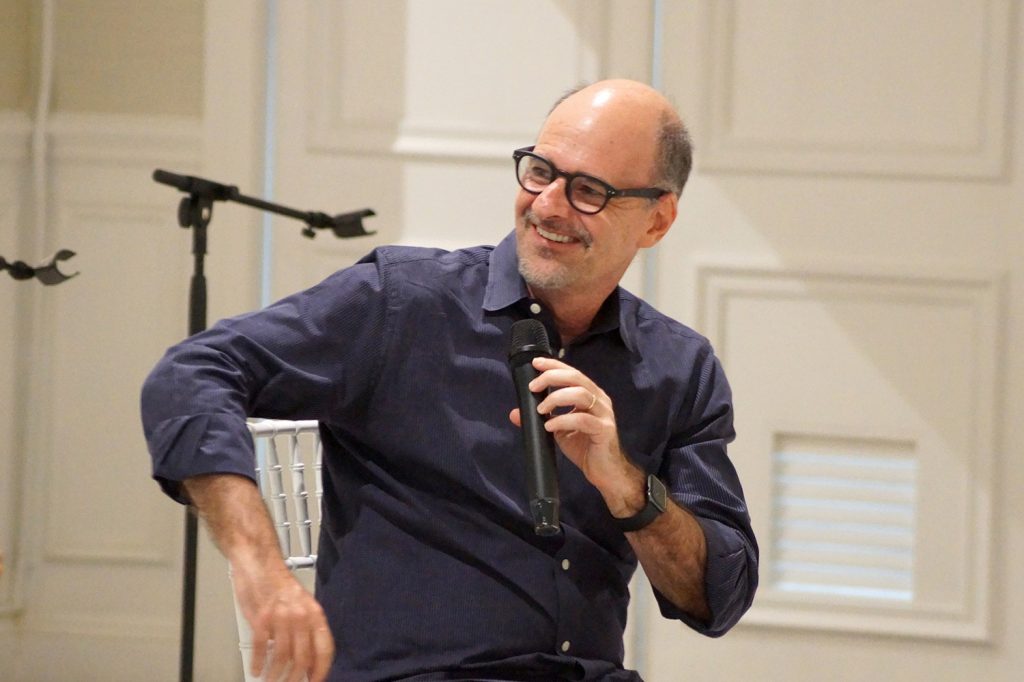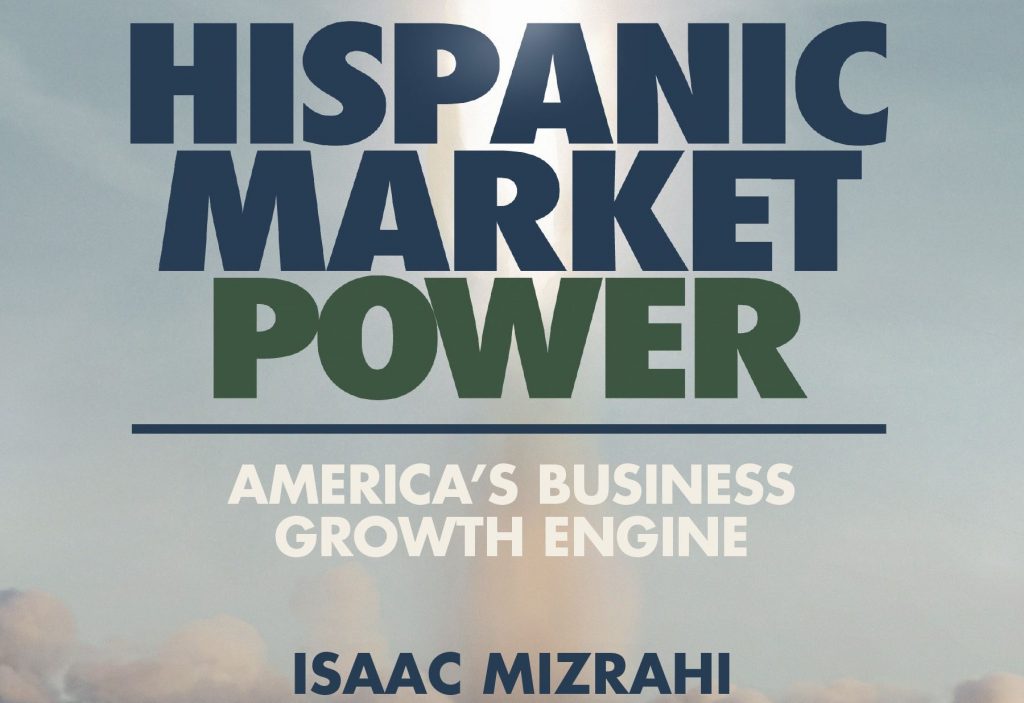Written by Steve Boehler with special guest Isaac Mizrahi
By now, everyone knows that the Hispanic population in the US is growing rapidly. This growth has been consistently covered by most news organizations in recent years. Despite this growth, many companies are not connecting with or adequately serving this key audience. What can a CEO or marketer do about that?
Our friend Isaac Mizrahi has the answer in his book Hispanic Market Power. The book’s subtitle says it all: America’s growth Engine.
I first met Isaac over twenty years ago when he was working at Sprint. Today, Isaac is CEO of Alma, the most awarded and influential Multicultural agency in America, with an unprecedented 32 Cannes Lions and 21 Effies Awards. Alma has been recognized by Ad Age in their annual “A List” (the top 10 US Ad Agencies) seven times in recent years including recognition in 2022.
I caught up with Isaac and we discussed his new book and how marketers and agency execs can help their firms succeed by supporting the Hispanic market.
New CMOs are appointed every day. What advice would you give to a new CMO about Hispanic Market Power?
Isaac: That Hispanic Marketing is about Growth Marketing, that they need to “forget” everything they heard about it in the past, including the failed “Total Market” approach, and learn from the latest ROI/Effectiveness studies that point towards the importance of an authentic, culturally relevant approach to successful connect with the segment.
What should a new CMO or marketing leader do in the first 30, 60 and 90 days about the Hispanic Market Power opportunity?
Isaac: In my book, I have a step-by-step guide that includes assigning accountability and executing a data and information audit on the subject. These first steps are essential to quantify your business opportunity, which will help you develop your strategies and support your resource allocation process. Also, it is key to surround yourself with truly tested subject matter experts, internally and externally. Unfortunately, today anyone with a Hispanic background may be considered an expert in Hispanic marketing, which may even hurt the brand, depending on the strategies adopted by following their advice.

Isaac Mizrahi
Many executives are not “brought up” in firms that appreciate the importance of sound multicultural marketing. How would you recommend that they go about creating other advocates within their firms?
Isaac: Connect with the industry’s best practices, like being part of the ANA’s AIMM organization, or attending the Hispanic Marketing Council’s conferences and webinars. Ask your Hispanic ad agencies and consultants to create an ongoing learning program or read articles and books on the subject. Nowadays, Hispanic Marketing is a fact-based discipline with clear best practices and ROI principles; it’s a much richer knowledge environment than the one I faced when I immigrated to the US almost 25 years ago.
What advice do you have for small agencies (under 150 staff) with regards to the future and how they can remain competitive?
Isaac: First, to sincerely believe that the quality of an idea and its ultimate effectiveness is not related to the size of the agency’s staff. I can speak by example since alma has been leading the country in effectiveness according to Effie’s ranking and leading creative rankings in the country (and the world) with a team of under 150 employees.
Today’s marketing environment favors agile, flexible teams that operate under a strong unifying culture. Large agencies tend to get lost in their several layers, complicated processes, with often too many cooks in the kitchen.
Most agencies in the US are actually very small – less than 50 staff. What can an agency with 10 or 20 staff do to remain relevant in this changing consumer landscape?
Isaac: Don’t try to pretend to be a big agency. Use your size as a competitive advantage by offering your clients a hands-on, personal experience. You may not have the scale and size some clients may like, but you can still be the most effective agency out there based on results, and effectiveness beats efficiency every day when it comes to growth.
Reading between the lines, it seems clear that one message included in Hispanic Market Power is the importance of company leadership to take responsibility for ensuring that this market opportunity is a core strategic focus of the company. If this is not already a focus, how should the C-suite get started?
Isaac: By making this a priority beyond the Marketing department, by discussing this across the C-Suite, bringing the Board of Directors to the fold, and assigning seasoned and knowledgeable executives to lead this initiative.
Furthermore, it is also necessary to recognize that a successful Hispanic Marketing program can’t depend on a resource allocation model that treats the segment as an incremental opportunity, that relies on the same old “if I find some extra budget, I will definitely invest in it.”
If this is not a priority of company leadership, what can other executives do to raise the issue?
Isaac: Develop a business case. Based on my observation working with more than 100 brands in my career, on average, for most B2C brands in America, the Hispanic segment can represent 15% to 30% of sales and a much higher percentage of a brand’s growth.
Put these numbers on paper, measure the total revenue and profits derived from the Hispanic segment, and start discussing what would happen if you began to lose relevancy with the segment, and what it would take to accelerate this growth. Compare these numbers with how much you’re currently investing in the segment, and I am sure you will realize how underfunded this opportunity is.
What are some companies and brands that really “get it”? How is it reflected in their activities?
Isaac: I am lucky to partner with a few companies who demonstrate their commitment, like McDonald’s, and P&G, consistent leaders in Hispanic Marketing with decades of investment and relevant programs.
These companies have the support from their top managers, have allocated resources proportional to the business opportunity, have surrounded themselves with subject matter experts, and have listened to these experts.
But I think this list may increase in the next few years, since I have noticed an increase in companies asking for support when it comes to Hispanic segment strategy and creative, mainly fueled by their need to search for new areas of growth.
What are some companies and brands that really don’t “get it”? How is that lack of appreciation reflected in their activities?
Isaac: Unfortunately, over the past ten years, we have witnessed several brands adopting the failing “Total Market” approach, where brands decided to have one single approach, one single message to all consumers, ignoring that a significant % of the US population was expecting brands to have a more authentic, culturally attuned approach.
I have worked with brands that lost hundreds of millions of dollars in sales over the past decade to realize that the “one-size-fits-all” approach delivered sales and market share decline disguised as “great” savings and short-term efficiencies.
You can’t have sustainable growth in America by ignoring the diverse segments, and the Hispanic segment leads the diverse segment by far!
Knowing what you know today, what advice would you give to 30-year old Isaac?
Isaac: Be patient; pace yourself. Don’t be too harsh and too critical of others and of yourself. Diversity starts with being more tolerant, more understanding, and less judgmental. Beware of limiting beliefs, don’t be self-conscious of who you are and your accent, and be your authentic self unapologetically.
Isaac Mizrahi has spent his 30+ years career working with brands such as Coca-Cola, Bellsouth, Nextel and Sprint, in several different functions covering multiple geographies. Isaac has been a speaker in several multicultural marketing conferences and has been featured in the New York Times, San Francisco Chronicle, PBS, Ad Age, Ad Week and other industry publications. In 2006 he was recognized as U.S. Hispanic Marketer of the Year by “Marketing y Medios” for his work at Sprint-Nextel. In 2022 Isaac was selected by AdWeek as one of the country’s 50 top Marketing executives. Over the past decade he has transitioned from the client side of the business to the agency side, working with corporations like McDonald’s, P&G, PepsiCo, MolsonCoors, Google, Lilly, State Farm, among others.
Isaac also has a monthly online column on Forbes.com where he writes about Multicultural Marketing in America for thousands of readers and is the author of the recently released book “Hispanic Market Power – America’s Business Growth Engine”.
Steve Boehler, founder, and partner at Mercer Island Group has led consulting teams on behalf of clients as diverse as Ulta Beauty, Microsoft, UScellular, Nintendo, Kaiser Permanente, Holland America Line, Stop & Shop, Qualcomm, Brooks Running, and numerous others. He founded MIG after serving as a division president in a Fortune 100 when he was only 32. Earlier in his career, Steve cut his teeth with a decade in Brand Management at Procter & Gamble, leading brands like Tide, Pringles, and Jif.
